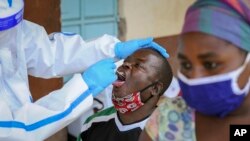Kenya has stepped up efforts to find a local treatment for COVID-19. The Kenya Medical Research Institute (KEMRI), East Africa's leading medical research facility, is testing the efficacy of an herbal medicine known as Zedupex.
The search for both a cure and a vaccine for the coronavirus has intensified around the globe, including in Kenya, as medical researchers race to find the elusive remedy.
Dr. Festus Tolo of Kenya’s Medical Research Institute is the lead scientist tasked with finding out whether an herbal-based drug will be effective against COVID-19. Zedupex, developed in 2015 by Kenyan researchers, has been used in the treatment of herpes.
Tolo says his team does not know yet whether the drug will work against the virus.
“We are still in very early stages. We cannot be able to say, knowing that the herpes simplex virus is a DNA virus and the coronavirus is an RNA virus,” he said. “This really means that we need to -- first of all -- to confirm, check whether there’s activity before we can be able to really say this is a product we can explore further for COVID management.”
Rudi Eggers is with the World Health Organization. Eggers says that standardizing the various herbal cures could be quite a challenge.
“In other medicines, we find that there are specific levels of the active ingredient and in herbal cures frequently you find varied components and then also levels of those components in there,” Eggers said. “So, in fact you’d have to standardize these cures to make sure that you know what is in them and what component is actually acting. So that’s quite a step to be taken before actually evaluating these cures.”
Dr. Kefa Bosire an ethnobiologist, based at the University of Nairobi, also has reservations about traditional cures, saying that mass production could be an issue.
“The immediate challenge we would face is getting sufficient quantities of the plant so that we can prepare them to supply the number of patients that might require on a short notice, like we have experienced during this pandemic,” Bosire said. “So, this would require a lot of work to go into identifying the best way to upscale the growing and collection of this materials."
Despite these hurdles, researchers at KEMRI are pressing ahead with their study of herbal treatments for COVID-19.
Kenya itself has seen more than 1,000 confirmed cases of coronavirus disease so far, and about 50 deaths.








